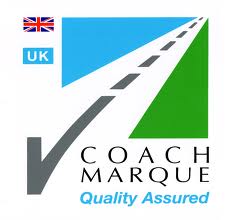Accreditations
CoachMarque is the only universally recognised kite mark of quality in the UK coach industry. It is concerned with all aspects of the business and not just the vehicles themselves. All CoachMarque companies operate to a strict set of criteria and are regularly assessed by an independent third party to ensure compliance with the highest standards of operation.
Coastal Coaches of Warton are proud to announce that we have passed another stringent, independent audit with flying colours, And all of our coaches carry the accreditation.
The list of standards that accredited companies have to adhere to is long but include the following:
* All vehicles will be subject to a rigorous preventative maintenance programme to maximise reliability and safety
* The driver will be in full uniform
* The coach will be presented in a clean and safe condition and be fitted with seat belts
* All vehicles will be equipped with a mobile communication system
* All accredited vehicles will be under 10 years old and comply with the latest European safety standards
* And remember, only 49 UK coach operators, and only six in in the North-West of England, have qualified for CoachMarque.
Since October 2013 Coastal Coaches have been licensed members of BUSK, an organisation that promotes safe child road transport throughout the UK. (BUSK License no BE0078). The following text is advice from BUSK for teachers.
What are the legal obligations applicable to schools when making transport arrangements for school trips and visits abroad?
Obtaining three quotes from a transport company and choosing the cheapest is definitely not demonstrating the correct culture and attitude to the safety of pupils in a school’s care. The law requires a school to provide a ‘safe journey’. An adequate written risk assessment that clearly identifies any risks to passengers and shows how potential risks will be reduced is crucial. Risk assessments do not have to be onerous and once completed should be re-visited once a year to re-assess standards. This specific risk assessment is not about the activity or purpose of the trip. This risk assessment is about:
• The standard and type of transport used.
• Qualifications and experience of the driver (when it is necessary for two drivers to be hired for longer trips
to comply with Drivers’ Hours Regulations).
• Route to be travelled.
• Forward planning including emergency plans in the event of breakdown, accident or illness.
Every school should have a Transport Document that includes a Seat Belt Policy, clearly detailing how seat belt wearing will be enforced. Safety advice given to the school by the coach company must be taken seriously. Once on board a coach it is the driver that is in charge and not the teacher. Schools must adhere to a transport company’s safety rules and instructions just in the same way that they would when travelling by sea or with an airline. This is a legal requirement. Schools must be aware of and adhere to seat belt legislation in all respects. For clarification please contact BUSK directly.
SCHOOLS MAY CONTACT BUSK FOR FREE HELP AND ADVICE ON HOW TO PRODUCE A TRANSPORT/SEAT BELT POLICY. MORE INFORMATION ABOUT THE REQUIREMENTS OF SCHOOLS WHEN ORGANISING SCHOOL TRIPS AND VISITS ABROAD CAN BE FOUND AT WWW.BUSK-UK.CO.UK.
What are the consequences for schools that do not fulfill a legal duty of care for pupils and others in their care on a school trip or visit abroad?
In 2006 Corporate Manslaughter Laws were amended to make it easier for courts to successfully prosecute transport companies, local authorities and schools who failed in a legal duty of care to protect others. Where it can be shown that a school has failed to take adequate care in making transport arrangements for pupils and as a consequence it can be proven that this resulted in the death of a pupil, then the school’s management team could be found guilty of Corporate Manslaughter. This could result in a large fine and courts have the power to give a school a Publicity Order, effectively ordering the school to advertise in the media that they had been found responsible for a child’s death.
This information has been prepared by BUSK and approved by Mike Imperato of New Law Solicitors. The advice given would be no less than a court would ask and expect to see if a legal action was taken against a school should something go wrong. A court would expect a governing body of a school to have an audit trail defining transport arrangements and what method was selected when it came to hiring transport. Choosing the cheapest company will not satisfy a court that the school had done everything necessary to fulfill a duty of care for the pupils.
Coach travel is comparatively safe when hiring from a reputable operator that observes all the safety rules and meet compliance requirements but it is teachers and governors who are required to provide a ‘safe journey’. Parents trust schools to make transport arrangements for their children based on safety criteria and not one of cost.
We at Coastal Coaches are happy to answer any questions you may have.



